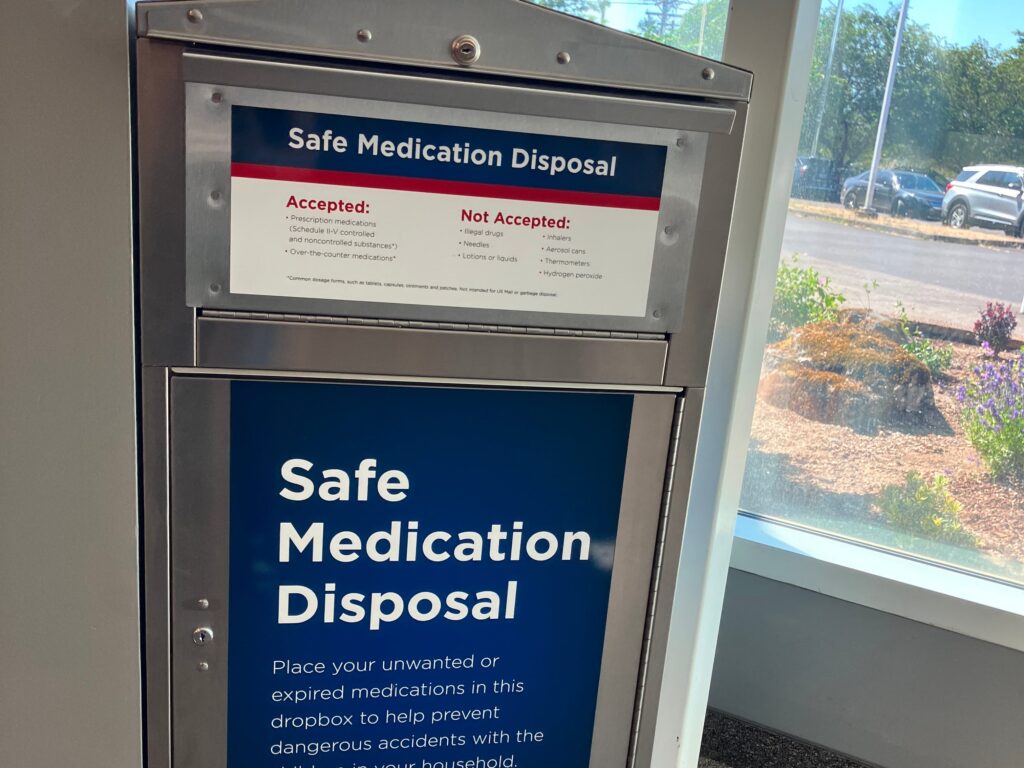In addition to other service failures, the state fined a nonprofit $648,500 for failing to provide drop-off locations in numerous locations throughout the state as part of Oregon’s drug take-back program.
Officials from the state Department of Environmental Quality announced Monday that the Drug Takeback Solutions Foundation, based in North Carolina, which gathers and discards unwanted, unused, and expired medications, had broken multiple aspects of Oregon’s drug take-back statute.
According to the DEQ’s notice of civil penalty, the organization has received multiple notices since 2023 for not meeting specific requirements, despite the DEQ having authorized the foundation’s operating plan in June 2021.
Throughout the state, pharmacies, public offices, hospitals, and clinics are expected to have kiosks where residents can securely dispose of prescription or over-the-counter medications. The nonprofit is the smaller of two independent program operators in the state, both of which are under the DEQ’s supervision.
According to Michael Lee, a DEQ program coordinator, unused medication can contaminate water if flushed down a drain and cause mishaps or abuse if left in cabinets.
According to a list of enforcement actions on its website, the penalty against the Drug Takeback Solutions Foundation seems to be the biggest fine the DEQ has assessed in more than a year. The biggest fines DEQ has ever imposed were around $2.1 million for air quality violations against Herbert Malarky Roofing Co. and a comparable sum for water quality breaches against the Port of Morrow in 2021. According to a DEQ representative, the Port of Morrow penalty was raised to $2.4 million in settlements, while the roofing company charge was lowered to $1.4 million.
Spokesman Hillary Titus announced on Wednesday that the charity is contesting the punishment.
According to Titus, the foundation is still totally dedicated to thorough and compliant drug stewardship.
According to the DEQ, the foundation’s inability to achieve the program plan’s convenience standard accounts for the majority of the $617,000 punishment.
A program operator is required by the state’s 2019 drug take-back statute to offer a minimum of one drop-off location in every county.Additionally, it must offer a minimum of one drop-off location per population center, which is a city or town plus the region within ten miles of its center, as well as one more location for every 50,000 city or town residents.
However, according to the DEQ letter, the foundation failed to set up the necessary number of drop-off locations in 155 population centers in Oregon during its third year of operation, fiscal 2023–2024. In five counties—Gilliam, Grant, Morrow, Sherman, and Wheeler—it offered absolutely no sites.
In order to raise awareness that year, the charity held 67 collection activities and sent out at least 200,000 direct mail postcards, obtaining a variance to offer additional services in place of the mandatory drop-off sites.
However, the DEQ claims that it failed to do so as well, reporting that it held 27 events and sent approximately 134,500 postcards.
The DEQ letter states that the foundation reported spending only $225,211 that year, despite the program’s collection and disposal services being predicted to cost $842,886 annually. This indicates that by breaking the rules that year, the group made almost $617,000 in profit.
The DEQ denied the foundation’s request for another variance for the fiscal 2024–2025 operating year.
According to DEQ officials, the foundation was also fined by the state for inadequate package order tracking and for failing to provide specific drug materials, such as some unique mail-back packages for pre-filled injector items that are not accepted at drop-off locations.
According to the DEQ letter, the charity also neglected to bill pharmaceutical companies for paying for the take-back program.
The DEQ notification states that in addition to the fee, the foundation has 60 days to set up the necessary number of drop-off locations.
More detailed financial accounts, proof that it has supplied the necessary quantity of auto-injector packages, and a method to monitor and report mail-back orders must all be delivered within 30 days.





More Stories
Oregon drug take-back operator hit with hefty state fine for lack of drop-off sites
Oregon drug take-back operator hit with hefty state fine for lack of drop-off sites
Oregon drug take-back operator hit with hefty state fine for lack of drop-off sites